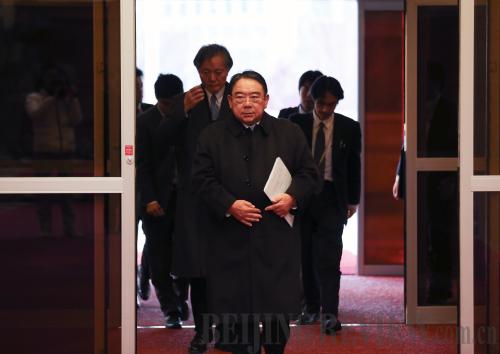|
 |
|
ENVOY: Japanese Ambassador to China, Masato Kitera (front), arrives for a meeting with Chinese Foreign Minister Wang Yi in Beijing on December 26, 2013. At the meeting, Wang expressed strong condemnation over Japanese Prime Minister Shinzo Abe's visit to the Yasukuni Shrine (DING LIN) |
Making a choice
Chinese Ambassador to Japan, Cheng Yonghua, published an article in Mainichi Shimbun, one of Japan's major newspapers, on December 30, 2013. In the article he stated that China has always differentiated Japanese people from Japanese militarists, and war criminals from ordinary soldiers. Like Chinese people, Japanese people were also victims of war, to which Japanese militarists should be held responsible.
"We have no objection to ordinary Japanese paying tribute to their family members. But Japanese leaders' visits to the shrine concern the country's understanding of war. China can never accept such visits," said Cheng.
Abe and his acts have once again exposed the dangerous intention of the Japanese right wing to beautify war criminals and challenge the results of World War II as well as the postwar international order, said Hua Chunying, a spokeswoman of the Chinese Ministry of Foreign Affairs. Urging Japanese politicians to reflect on their history and correct errors, Hua stressed that the Chinese and Asian people will never allow Japan to turn back the clock.
Abe's administration has often defined the Japanese-U.S. relationship as an alliance based on the same interests and values. However, Abe has recently reached the bottom line of the United States' conceptions of history and war, said Liu Jiangyong, a professor with Tsinghua University. On the issue of Abe's visit to the shrine, Washington and Tokyo's interests and values are quite different, Liu pointed out.
"If some countries were to worship Osama Bin Laden as a martyr 50 years later, would the United States accept it?" asked Liu. He added that regional instability is not in the interests of Washington's Asia-Pacific policy.
"This move amounts to a barefaced denial of the abhorrent atrocities the Empire of Japan committed during a dark chapter for humanity, and also a blatant refusal to face up to or learn from history," said People's Daily, the flagship newspaper of the Communist Party of China, in a commentary on January 2.
The commentary compared Japan's attitude with that of Germany. "Abe's conspicuous lack of historical honesty contrasts shamefully with the courage and vision of late West German Chancellor Willy Brandt, who dropped to his knees at the monument to victims of the 1943 Warsaw Ghetto Uprising in a spontaneous act of genuine repentance," the article read. "The sincere remorse and in-depth reflection of Brandt and other German leaders paved the way for their nation to be accepted by the international community. The moment Brandt knelt down, his nation stood up."
Now, Japan has to answer the question: Will it stand up from the shadow of war and become a responsible power in the region? Or will it resort to its old path and become a common enemy to its neighbors?
Email us at: dingying@bjreview.com
| 